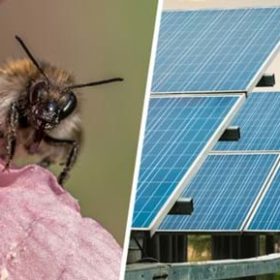Microgrid-forming PV microinverter from Enphase
The 97%-efficient device is said to be the most powerful PV microinverter developed by the company to date and is capable of forming a microgrid during a power outage. The U.S. manufacturer expects to ship the first products in December.
SolarEdge launches residential battery and inverter
The DC-coupled battery has 94.5% round-trip efficiency and the inverter offers up to 11.4 kW power and 10.3 kW backup power.
LG launches hybrid inverter for residential battery range
South Korean battery manufacturer LG Energy Solution has launched a new inverter in the Australian market, adding a 5 kW hybrid inverter to its Residential Energy Storage Unit (RESU) Home battery energy storage range.
Solar farms prove to bee hives of economic activity
A new study from researchers at the universities of Lancaster and Reading in the UK has managed to quantify the economic boost provided by the symbiotic relationship between solar farms and honeybee hives.
The long read: PV backsheets – replace or repair?
Backsheet chalking, especially of polyamide backsheet films, doesn’t take long to lead to cracks and then safety shutdowns. Sometimes, though, the period may be much longer or shorter than expected. Assessing the risk and whether on-site repairs offer a long-term solution is currently a topic of strong debate within the PV industry, as Cornelia Lichner from the pv magazine Germany team reports.
International Solar Alliance launches programs on solar and battery waste management, green hydrogen
The International Solar Alliance (ISA), which aims to mobilize more than $1 trillion of solar power investment by 2030 in its member countries, expanded its scope of work by launching programs on solar panel and battery waste management and solar-powered hydrogen production in its fourth assembly held recently.
Growing advantage for off-grid storage in grid-tied applications
Swiss-based Studer Innotec is launching a battery inverter which brings the advantages of the off-grid space to grid-tied installations in Europe. In this interview, Pierre-Olivier Moix, chief technology officer and board member at Studer Innotec, explains the differences to a standard energy home system, and some possible applications.
India offers lowest LCOE for rooftop PV, third-best generation potential
The levelized cost of solar electricity generation from a given rooftop area is the lowest in India (US$66/MWh) and China ($68/MWh), with the USA ($238/MWh) and UK ($251/MWh) representing some of the costliest countries, according to an international study based on data available as of 2018. The study also finds China (4.3 PWh/year), USA (4.2 PWh/year), and India (1.7 PWh/year) have the highest yearly potential of rooftop solar energy generation.
Big modules head for standardization
PV manufacturing giant Trina Solar says it has agreed with other industry players on a set of standard dimensions and other technical specifications for PV modules utilizing 210mm wafers – the largest currently available on the market. The manufacturer says it expects the China Photovoltaic Industry Association to formally release the standard before the end of October.
Co-located hubs key to battery industry competitiveness
A report from Australia’s Future Battery Industries Cooperative Research Centre which analysed the development of battery hubs in the U.S., Germany and Japan, has found that co-location and cooperation between industry and government were key to their success. For Australia to play the same game, it will have to leverage its wealth of resources, and clean up its act along the way.















